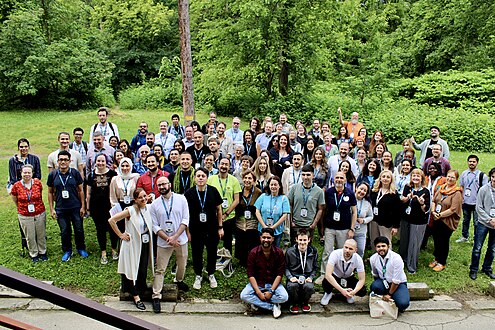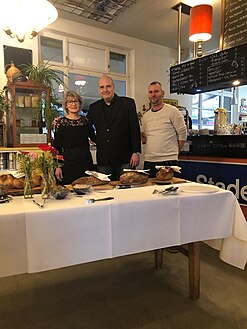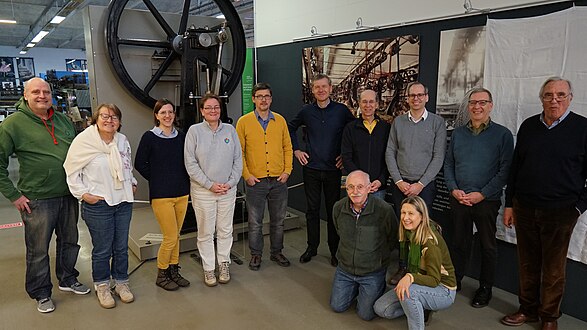Grants:APG/Proposals/2022-2023 round 1/Wikimedia CH/Impact report form
Purpose of the report[edit]
This form reports on Wikimedia CH's results for 2023 (1 January - 31 December). Wikimedia CH has recently become financially independent and does not rely on an Annual Plan Grant (APG) from the Wikimedia Foundation. Therefore, this report provides an overview of the year without strictly adhering to the APG format.
2023 snapshot: Key metrics for the year[edit]
| Metric | Achieved outcome | Explanation |
| Participants | 1,500 out of 1,050 | |
| Newly registered users | 150 out of 225 | Personnel changes within the Programme Lead team impacted this value. |
| Content pages created or improved | 30,000 out of 26,000 | |
| Content reused by other Wikimedia projects | 12,000 out of 9,000 | |
| People reached in Switzerland | 2,000,000 out of 1,550,000 - 1,650,000
|
Program impacts[edit]
Executive Summary[edit]
Intro[edit]
Wikimedia CH is well underway in implementing the ambitious plans set out in the 2022-2026 strategy. We have made significant progress towards becoming a major player in the field of free knowledge, which has created demand for our expertise, services and financial support. Our challenge in 2023 was to meet increasing demand while both living up to our quality standards and remaining agile in an ever-changing environment.
In 2023, we continued to professionalise our operations and outreach, aiming to render our processes, team and communication more effective. Concretely, that meant redesigning our internal structure, setting up a “Lead Team”, creating new programmatic strategies and organising processes to be more holocratic.
It also meant recruiting several new team members to fill empty positions and build our team’s capacity, as well as restructuring our administrative, human resources (HR) and finance operations to reflect the growing needs of our organisation. We worked to improve our membership engagement strategy and secure our chapter’s financial future by developing new fundraising approaches.
Integral to these efforts was developing a chapter-wide thematic focus to align our outreach efforts and programmatic activities. The new theme is “Building a more inclusive future”, which highlights our work to create a future where knowledge, heritage and opportunity belong to everyone – and a digital ecosystem where everyone belongs. As we look at implementing this theme in 2024, we aim to empower diverse perspectives, create new models of heritage and innovate for a more open, equitable democracy.
Our impact[edit]


From a programmatic perspective, 2023 was another important year for building relationships, developing new strategies for Programmes GLAM and Community and engaging the community. We celebrated the 175th anniversary of the Swiss Federal Constitution as an occasion to highlight our work advancing free knowledge and the importance of Wikipedia and other open knowledge projects for democracy.
This theme and others guided several GLAM activities, including three GLAM-on-Tours and several interesting speaking opportunities, including one in New York City. Through Programme Community, we led and supported many activities to engage volunteers and recruit new ones – work that was boosted by our new membership engagement strategy. In Programme Education, we welcomed two new team members in the middle of the year who spent the second half of the year integrating into the team and taking ownership of the Education strategy. In Innovation, we explored important topics like artificial intelligence (AI) and investigated how they will impact Wikimedia projects going forward. Supporting all of this were our outreach efforts, which included partnerships, advocacy, fundraising and communication. We built out our membership engagement approach and are continuing advocacy efforts around important knowledge topics at the Swiss and European levels.
Our people[edit]
The most significant changes for our organisation happened within our team. With our long-time Education Lead, Ilario Valdelli, now leading the Innovation programme, we recruited two new team members to bring Education forward: Daniela Mor and Vivian Epiney. We also clarified certain roles. For example, we put our former Outreach & Communication Manager, Kerstin Sonnekalb, in charge of the Outreach & Communication programme, creating a more aligned approach to this programme going forward.
Outside of the programme teams, we hired Clara Wiest, who joined as Operations and Development Officer at 80% to manage, among other things, membership, fundraising and board activities. Louis Gonin, who works at a 50% rate on our accounting, also joined the team. At the very end of the year, we recruited an Operational Team Lead, Andrea Scheller, who began her activities at the beginning of 2024. With significant experience managing operations and people, and as a board member of our partner Opendata.ch, Andrea is well-placed to lead and oversee activities from an operations point of view. She will be critical to ensuring the efficiency and impact of our organisation going forward, also taking on responsibility for our impact improvement efforts.
In addition to building our team with new employees, we continued to clarify roles and responsibilities and improve cooperation through regular Lead Team meetings and in-person retreats. We have significantly improved collaboration through new meeting structures, reporting and project management tools, and better governance.
Our organization[edit]
Operationally, we worked on an information technology (IT) strategy that includes a risk assessment and knowledge transfer. It also includes a concept called a Tech Boost, which Programme Innovation created to enhance projects via developer support. We created a Conflict of Interest document that outlines a code of conduct for Wikimedians and Wikipedians who wear multiple hats, and we continued work around organisational sustainability in line with the Wikimedia Environmental Sustainability Covenant.
We continued our work of professionalising our communication, both to external audiences as well as within our team. We strengthened our approach to fundraising and membership and now have a new membership engagement strategy in place.
From an administrative viewpoint, we split and reorganised the budget for Education and Innovation, which was part of our general efforts to improve our finance and budgeting processes to make them more effective and efficient. We also worked to ensure compliance with Swiss data protection laws, including the recent Federal Act on Data Protection. Last, we are revisiting our HR and compensation policies and sought feedback from a local works council. They provided valuable feedback and input but found our policies to be comprehensive and on the right track.
Our future[edit]

The strategic work done in 2023 to create a more robust, efficient and holocratic organisation has created a strong foundation from which to expand our impact in 2024. We are well-placed at various levels of society – cantonal, federal and European – and across sectors to build on the momentum we have created since launching our five-year strategy in 2022. We have ambitious plans and are now beginning to have the team and processes in place to make significant strides towards our objectives.
Looking to 2024 and beyond, we will continue refining our organisation to expand our impact and future-proof our finances while adapting to an increasingly changing environment. Topics like climate change and AI will remain priorities, both for our activities and for our organisation. For example, in 2024, we will conduct a carbon footprint analysis with a third-party supplier and develop policies around our environmental impact. Also, the Mercator Foundation has selected Wikimedia CH to participate in the “Value for Good” programme to help us better measure and ensure our impact, efficiency and return on investment.
This and other initiatives will continue to build skills within our team, as well as new tools and approaches. This internal capacity-building will be critical as we begin developing our next five-year strategy starting in 2026.
Strategy at a glance[edit]
Our vision[edit]
As Wikimedia CH, we:
- Open doors and bring people together with the aim of disseminating free knowledge for a smart and open society.
- Enable our communities to share knowledge and connect them with Wikipedia and other Wikimedia platforms.
- Are a collaborative and accountable association representing the interests of our multilingual communities in Switzerland.
Our mission[edit]
- To collect, curate and disseminate free knowledge on Wikipedia and through other Wikimedia projects.
- To promote the work of contributors (more information: Community web page).
- To help Swiss memory institutions share their knowledge, collections and curatorial resources digitally with a global community through a global platform – all this to make (Swiss) cultural heritage and its diversity more accessible to the world (more information: GLAM web page).
- To sensitise all levels of education to sustainable use of digital information (more information: Education web page).
- To advocate for free knowledge, including at the political level.
Our strategy[edit]
Impact directions[edit]
- GLAM – We collaborate with galleries, libraries, archives and museums (GLAM) throughout Switzerland to provide digital access to memory institutions’ collections and artefacts. We aim to share the country’s culture and history in a sustainable format and across all borders.
- Education – We deliver and collaborate on education programmes that advance learning at every level, for both children and adults. Our work supports lifelong learning as well as teachers and trainers at schools, universities and other institutions of higher education.
- Community – We help the Wikimedia CH community grow, supporting existing members and cultivating new Wikipedians. Among other activities, we train and mentor Wikipedia editors and support the diverse and multicultural interests of our community with targeted programming.
- Partnerships & Outreach – We believe in using our unique position in the field of information exchange to be an influencer on national and international issues concerning open access and open knowledge. We offer our viewpoints on copyright, technology and more.
- Innovation – Our Innovation Lab is a dedicated space for experimentation and improvement that helps us anticipate and address societal changes while optimising projects that advance our core purpose. We aim to create a safe framework to explore bold ideas, exchange knowledge and improve tools in an accessible, non-judgmental way.
Programme GLAM[edit]
Overview[edit]
In 2023, the GLAM programme refocused its activities under the relatively new Programme Lead, Sandra Becker, who joined in the second half of 2022. Sandra spent the first half of the year developing a new GLAM strategy, which guided activities and projects throughout the year and into 2024.
The new strategy focuses heavily on supporting inclusivity in cultural institutions. In 2023, this work centred mainly around museums, as per the new definition of museums announced by the International Council of Museums (ICOM) in 2022, but it also touched on more general efforts in the programme. We lent our expertise and time to amplifying access to cultural knowledge and enhancing gender equity both in the professional field and in the collections’ representation of female artists. We gathered best practices from other GLAM institutions and like-minded organisations and worked to translate them for the Swiss museum landscape. We continued to strengthen our relationship with ICOM, positioning our chapter as an important partner to help realise their strategic goals.
The strategy also aims to facilitate new partnerships and opportunities. A key success was our collaboration with the Swiss art association Femme Artist Table (FATart), which led to a free dedicated community space for Wikimedia CH events (see the highlight activity below). We also raised Wikimedia CH’s visibility and reach by giving speeches and presentations at several high-profile events, including a presentation on knowledge equity in GLAM at the NGO CSQ67 Forum in New York City.
Highlight activity[edit]
Dedicated Community Space in Schaffhausen
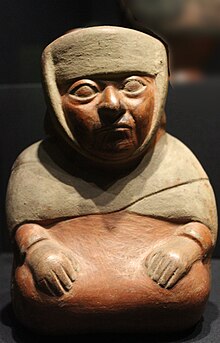
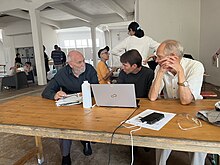
One of the big successes of 2023 was a partnership with the Swiss art association Femme Artist Table (FATart), which led to them offering our community a meeting and editing space in Schaffhausen.
The opening event for the space was on 2 September, with a cocktail event and a Wikipedia workshop. The space also hosted several other workshops, including a workshop on women’s monuments; the Anti Bias Wiki Time event, which included a presentation on artistic research on bias and discrimination by artist María Linares in collaboration with Wikipedian IvaBerlin and a free Wikipedia atelier; and a Mini GLAM event on Peruvian Moche Culture.
The partnership was born from cooperation between GLAM Lead Sandra Becker and FATart co-founder and artist Ursina Gabriela Roesch. As an artist, Sandra exhibited several times at the FATart fair. She invited Ursina to the GLAM-on-Tour at the Montreux Jazz Archive in November 2022, which resulted in Ursina becoming a Wikipedian.
Located on the fourth floor of the “Kammgarn West” district, the community space organises year-round activities with an exhibition programme specifically dedicated to female artists. It offers ample space for discussions, workshops, co-working and a café-bar service. In the second half of the year, Wikipedia authors met there to research, edit, network and exchange experiences. The aim of this innovative space is, above all, to contribute to more female representation on Wikipedia and its sister projects.
The collaboration advances Wikimedia CH’s aim to increase inclusivity on Wikimedia platforms, as well as FATart’s core mission to ensure equal rights for women* in society, especially in the arts. Says Ursina, “As FATart, we are committed to the visibility, recognition and appreciation of women in the art world, which is still dominated by men.”
[As per FATart: “The gender asterisk (*) serves as a reference to the social construct of ‘gender’. The asterisk after ‘women’ is intended to clarify that it refers to all persons who define themselves, are defined, or are visually perceived as ‘women’.”]
Key programme activities[edit]
- Gave a presentation on knowledge equity in GLAM at the NGO CSW67 Forum, a civil-society gathering in New York City that runs parallel to the United Nations Commission on the Status of Women.

- Organised three GLAM-on-Tour events: one at the Abbey Library in St. Gallen in May, one at the Zug Library at the end of June and early July, and one with the Swiss National Sound Archives in Lugano in November. We also produced a promotional video demonstrating the benefits of the GLAM-on-Tour events.
- Organised a global campaign for International Museum Day 2023, collaborating with ICOM, the German and Austrian chapters and GLAM partners. The campaign included a photo contest, a video release and an online roundtable on ICOM’s new definition of museums.
- Supported International Archives Week 2023 with the Association of Swiss Archivists and the German and Austrian Wikimedia chapters around the theme “ArchivesUnited”. This campaign included an online roundtable about the Swiss archive landscape.
- Launched a partnership with the Swiss Archive of the Performing Arts to promote archives and data about the performing arts in Switzerland.
- Trained 21 librarians from the Vaud canton to add more than 190 references to 40 Wikipedia articles as part of the University Library of Lausanne’s #1Lib1Ref Campaign.
- Worked with the Swiss National Library to build a digital collection that compiles, archives and freely shares Wikipedia content related to Switzerland. The Wikipedia collection is listed in the library catalogue and can be consulted through e-Helvetica Access, the library’s online portal.
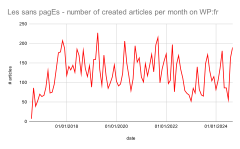
- Strengthened existing GLAM partnerships, including the French-speaking WikiRomandie network and our cooperation with Les sans pagEs and FemNetz, a feminist network in the German Wikipedia.
- Sponsored the Journée des logiciels libres en Archives, Bibliothèques et Centres de documentation (Libre ABC) in the Geneva Ethnography Museum and gave a presentation entitled “Wikidata and the Swiss Archive Landscape”.
- Gave a keynote speech entitled “Wikidata as Normdata” at the convention of the Swiss Archivists Association (VSA-AAS) in Sarnen and also presented the VSA-AAS Map Integration Project. Both topics were included in the online Swiss review Arbido, published by VSA-AAS.

- Participated, in cooperation with other Wikimedia chapters, in the 20th ICOM Triennale Conference in Valencia. It was the first time Wikimedia chapters participated in the event and contributed with a stand, a project page and speeches (see the event report.)
- Organised a WikiNeocomensia workshop with the Neuchâtel State Archives to mark the 175th anniversary of the Republic and the canton of Neuchâtel and the founding of modern Switzerland. The workshop aimed to improve and create Wikipedia articles and content about the historical figures who left their mark on Neuchâtel.
- Supported the 9th Swiss Open Cultural Hackathon (GLAMhack 2023) organised by OpenData.ch, bringing together those passionate about GLAM and coding to work on various projects focused on colonial collections and provenance research.
- Supported a series of WikiNeocomensia online workshops and professional meetups for GLAM professionals to enrich Wikipedia resources on the built heritage in the canton of Neuchâtel, engage local GLAM partners and train new Wikipedians. Working with Programme Community, we organised an in-person workshop in October that was open to Community members, prompting a few of them to participate.
- Awarded grants to fund two initiatives that support diversity and inclusion in Wikimedia projects and within our community: an event for “Who writes his_tory?” to convene women and non-binary Wikipedia contributors and the campaign Wiki Loves PRIDE (inSPORT) inEurope to address the content gap on LGBT+ topics in Wikimedia projects and participation gaps of LGBT+ contributors in non-English languages.
Programme impact[edit]
Key accomplishments[edit]
- Our partnership with VSA-AAS led to several outreach opportunities, such as a keynote speech, a publication and the integration of our map service on their website. We had a significant presence at their event, helping raise our profile and positioning us as a trusted partner.
- Our partnership with FATart led to a community space and allowed us to organise several events for free.
- We deepened our cooperation with ICOM and extended our activities around International Museum Day 2023.
Lessons learned[edit]
- At events in the community space, we need more Wikimedia CH staff members to support volunteers and engage interested participants.
- Organising GLAM-on-Tours in the summer is difficult, as many Wikipedians are on holiday and there is minimal interest.
- When partners trust us, they are willing to provide more support than originally envisioned, such as FATart providing us with a free meeting space. We shouldn’t be afraid to ask for financial or in-kind support from partners when appropriate.
Looking ahead[edit]
For 2024, the GLAM Programme will focus on museum transformation in alignment with ICOM’s new museum strategy, which focuses on civil society, sustainability, disruption and digitalisation. Through different events and video releases, we will aim to address the challenges for museums in the future and explore new forms of archiving and creating knowledge bases. Our main theme for 2024 is decolonising collections and encouraging inclusive narratives. Our guiding questions will be:
- What narratives can be told?
- How can marginalised knowledge be presented?
- How can oral history be integrated into Wiki projects?
The GLAM Programme aims to extend our cultural network by reaching out to small- and medium-sized GLAM institutions for more diverse knowledge-creation processes.
Programme Education[edit]
Overview[edit]
Programme Education saw important changes in 2023. As mentioned above, we welcomed two new team members to manage Education activities in the second half of the year. Daniela Mor started at 50% in June and now works at 80% as the Education Expert. She is based in Ticino and speaks Italian, Swiss German and English. In August, Daniela was joined by Vivian Epiney, the founder of DicoAdo (a longtime Education partner). Vivian works at 40% and speaks French and English.
Despite transitions within the programme, the team still implemented most of the annual plan. What’s more, not having an Education Lead for half of the year opened up opportunities for collaboration with other programmes and for other team members to advance Education projects. The Community Managers, in particular, stepped up to meet the demand for educational activities and support the new Education team members.
Highlight activity[edit]
Media in Piazza
One such collaborative project was the two-day workshop Wikimedia CH offered as part of the Media in Piazza series of events in Ticino. The event series, which is open to all secondary school classes in Italian-speaking Switzerland, brings together organisations and people working in the field of media and digital education. For years, Wikimedia CH has supported the event to advance our objective of making online knowledge more accessible and safer for young people. Past events have seen Wikimedia workshops that teach students ages 12-15 how to find and use information online, how to differentiate information sources and how to responsibly share knowledge.
This year’s theme of “Respect” aligned perfectly with Wikimedia and Wikipedia’s values. In line with the theme, Wikimedia CH offered a workshop on “netiquette” in online communities, including how to debate respectfully in the digital space. Using the five pillars of Wikipedia as a guide, the workshop aimed to translate the principles of neutrality, free and open knowledge, and respect into students’ daily interactions online. Through the workshop, we demonstrated that respecting each other is fundamental to carrying forward one’s ideas, having a constructive discussion and collaborating to improve knowledge.
The workshop was a resounding success, both in terms of impact and collaboration. Around 200 students participated over two days, underscoring how important the topic is for young people. Additionally, from an internal perspective, the workshop represented a deep and successful collaboration between different programmes and team members. While the two new Education Managers helped implement the event, they worked in tandem with the outgoing Education Lead, as well as the Community Manager for Ticino. This was an important step forward as our chapter aims to work in a more cooperative and less siloed manner.
Key programme activities[edit]
-
EduWiki Conference, Belgrade, Serbia
-
University of Zurich collaborated on a project about stereotypes in Wikipedia articles
-
Wikeys board game
- Worked on the certification workstream, learning from other chapters about how we might implement it.
- Officially sponsored the EduWiki Conference in Belgrade and gave two speeches about Wikimedia CH’s education strategy and education tools.
- Prepared materials for teachers using Openedu.ch as a knowledge base and set the stage for a more detailed look at the user interface in 2024.
- Collaborated on a project with the Institute of Psychology at the University of Zurich to teach 26 students to improve and expand Wikipedia articles around stereotypes. The project spurred significant engagement and discussion among students and staff, underscoring the interest in this topic.
- Hosted a Wikipedia edit-a-thon with Les sans pagEs to create biographies of women in medicine and biology at the "Gender equity and digital transformation" conference in Lausanne.
- Supported the translation of Wikeys into Italian, German and Swiss German; it is an educational board game for secondary students to understand Wikipedia.
Programme impact[edit]
Key accomplishments[edit]

- Following workshops we gave to librarians and teachers in Gland on the online dictionary for kids, DicoAdo, those trained were able to organise and lead workshops themselves. This illustrates our commitment to empowering educators with digital knowledge and tools for the long-term sustainability of our initiatives, even after Wikimedia CH is no longer involved.
- We strengthened our relationship with Wikimedia France, especially around educational projects, setting the stage for increased collaboration going forward.
- Programme Education worked with the new Wikimedia Innovation Lab to advance free online educational platforms, including migrating DicoAdo onto our servers.
- The team carried out all planned Education activities despite transitions among personnel.
- Programme Education successfully collaborated with other programmes on various activities to ensure a more holistic approach to our Education goals.
Lessons learned[edit]
- It’s essential to remain up to date on the evolution of schools’ programmes and curricula to ensure that we make a real impact. Especially now, as schools move towards digital education, we have a real opportunity to help schools evolve while encouraging the use of Wikimedia projects.
- Education is both transversal and trans-generational, meaning it touches all sectors and ages. Because our audience for Programme Education is broad and diverse, we must adapt and/or select our tools according to the demographic group we are targeting.
- We have made great strides internally to collaborate with the other programmes, particularly Community, on educational activities. That said, we can continue to improve knowledge sharing and communication within the team to build upon each other’s experience and make an even greater impact.
Looking ahead[edit]
In 2024, we will focus on what has been identified as “the missing link” in education: teacher training and lifelong learning. We will do this by strategically promoting the use of Wikimedia projects and specific tools (such as OpenEdu.ch and DicoAdo) in schools and by offering a new certification that enables volunteer trainers to validate their work. We aim to create a more sustainable approach to the concept of “training the trainer” and empower teachers and trainers to use these tools in their classrooms.
To expand our impact, we will look at innovative ways to fund new activities, as well as new partnerships to advance our mission. This includes continuing Programme Education’s close collaboration with Programme Community, especially in French-speaking Switzerland, with several new initiatives. Examples are training librarians on our educational tools for the Semaine des Medias, a project with the Historical Dictionary of Switzerland, and a Wikipedia training for students at the Haute Ecole d’Ingénierie et de Gestion du Canton de Vaud. We are also working with Wikimedia France on a candidature for a Wikeys workshop to be included as part of the Ludovia#CH Explorcamp.
Programme Community[edit]
Overview[edit]
As the first year with the full Community team in place, 2023 was full of activities that engaged Wikipedians and volunteers in Switzerland’s three major language regions. Several new initiatives took place, as well as recurring activities successfully executed by the regional Community Managers. Meanwhile, the Community Lead worked to develop the new programme strategy, which the team will begin implementing in 2024.
It was also a year of strong collaboration with the other programmes. With a complete team and diverse language capabilities, the Community Managers played an important role in activities that technically fell under programmes such as GLAM, Education and Outreach. This was a testament to the team’s engagement and commitment to our mission, as well as their valuable individual expertise. Going forward, this collaboration will create a strong foundation for one of the programme’s core goals: to engage the Wikimedia Community around all programmes to multiply impact.
Highlight activity[edit]
GLAM-on-Tour at the Swiss National Sound Archives
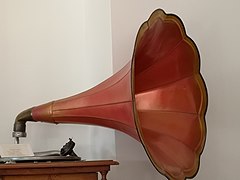
While officially falling under Programme GLAM, this year’s GLAM-on-Tour events saw both heavy involvement from and significant impact on the Community programme. In 2023, the GLAM and Community teams organised three GLAM-on-Tours: one at Abbey Library in St. Gallen in May, one at the Zug Library at the end of June and early July, and one with the Swiss National Sound Archives in Ticino in November.
These events required significant cooperation between the programmes. The Community Managers of all language regions stepped up, offering organisational support, linguistic expertise and regional relationships to ensure the events were successful.
The Ticino event, in particular, was a highly successful collaboration between the two programmes. One of the most multilingual GLAM-on-Tour events ever, it attracted 16 participants from Switzerland, Germany and Italy. Several of the participants were new contributors to Wikimedia projects, requiring more high-touch support from Wikimedia CH team members. What’s more, the focus on women in the sound industry and the varied programme activities attracted interest from a diversity of ages, genders, backgrounds and interactions with Wikipedia. There were even general public participants with no previous knowledge of Wikimedia CH, presenting an opportunity to introduce them to our organisation and potentially engage them as contributors to our projects.
While organising this event was challenging and required good coordination between the teams, it also allowed team members to divide responsibilities, share knowledge, appreciate other team members’ complementary skills and value each other’s contribution. Overall, it was a huge success that provided important learnings for continuing collaboration.
Key programme activities[edit]

- Developed a new strategy for community engagement in Ticino to build membership and visibility in the region and expand our network of local partners. Read the report about regional activities.
- Hosted around 45 active volunteers at New Year’s Brunches in each linguistic region and supported a community-organised hike at the Witi nature conservation area, providing our community with opportunities to get together and share experiences.
- Supported two successful Women for Wikipedia edit-a-thons to expand the visibility of women on Wikipedia while forging collaborations with two new partners, ETH Zurich and TX Group. We also worked with event founder and Wikimedia CH President Muriel Staub to create and implement a volunteer retention plan.
- Organised and led Frauenbewegungen-Mouvements féministes Biel-Bienne, a bilingual, community-driven Wikipedia workshop with the Biel library to train new Wikipedians while creating and editing articles about women.
- Supported several community-led writing workshops, including a workshop with the Swiss Alpine Museum in Bern on women mountaineers, an edit-a-thon with Photo Elysée Lausanne and Les sans pagEs on women photographers, an event at the Ballyana archive on industrial culture, a well-attended workshop at the Winterthur Library and a workshop at the ETH Library.
- Helped organise and attended three Wikicons: WikiConvention Francophone in Abidjan, Ivory Coast; the German-speaking WikiCon 2023 in Austria; and the itWikiCon 2023 in Bari, Italy.
- Partnered once again with Service Civil International (SCI) Schweiz to organise the Wikipedia Online Workcamp “Wikipedia for Peace Online: No More War”, as well as the offline camp “Wikipedia for Peace & Climate Justice Journalism”.
- Strengthened cooperation with Les sans pagEs in collaboration with Programme GLAM, including supporting the first workshop of the Wikiproject Witches on the theme of witch hunts in Switzerland.
- Forged a promising new partnership with Paulus Academy, an educational and cultural institution in Zurich.
- Supported the participation of two volunteers in Translating Queer Movements, Wikimedia Austria’s project to translate articles about the history of the queer movement into other languages.
-
New Year's Brunch
-
Writing workshop at the Ballyana archive
-
WikiCon 2023, Austria
Programme impact[edit]
Key accomplishments[edit]

- The edit-a-thon on women photographers at Photo Elysée Lausanne was so successful that the museum invited Les sans pagEs to have a monthly workshop in 2024.
- We had well-attended New Year’s brunches in all three language regions for the first time since Covid-19.
- We better aligned country-wide activities with a new dedicated Community Manager for the Italian-speaking region, as well as a Programme Lead who oversaw all regional projects.
Lessons learned[edit]
- Working with a dedicated museum staff member during workshops leads to better content since they provide solid documentation, as well as good participation, as museums have a built-in audience interested in the activities they offer.
- Organising events with an interesting theme, such as the GLAM-on-Tour in Ticino, helps increase participants’ diversity and engagement.
- By collaborating with other programmes, we can multiply our impact and advance the strategies of two or more programmes through one initiative.
- Often, potential institutional partners (and, we can assume, individuals) take Wikipedia and its sister projects for granted. Their omnipresence can make it difficult for people to understand how unique the concept is and why they need support. Our challenge is to help them understand why the Wikimedia concept works and, above all, how it works and why it works.
Looking ahead[edit]
In 2024, we will start implementing the new programme strategy. A central aspect of the strategy is to support initiatives that diversify our community. We will also review and adapt recurring activities to ensure alignment with this goal and the overall strategy. We will continue to expand collaboration with other programmes to create the greatest possible impact while sharing knowledge and working more efficiently internally. To this end, we will participate in the "Value for Good" Impact Academy with the help of the Mercator Foundation.
Partnerships & Outreach[edit]
Overview[edit]
Wikimedia CH is uniquely positioned to advocate for issues important to our Movement. As Switzerland is home to the United Nations and other international organisations and non-profits, as well as the European headquarters for many corporations and start-ups, our potential for impact at a political and social level is significant.

In 2023, our focus was two-fold: continue our advocacy work by fostering our collaboration with like-minded organisations and strengthen our outreach work with an approach more aligned to communication, fundraising and association member management.
In terms of advocacy, we continued to engage with partners like Parldigi and the Alliance Digitale in Switzerland, as well as European partners like the Free Knowledge Advocacy Group EU (FKAGEU) through Wikimedia Europe. At the national level, we provided feedback on two different public consultations on proposed laws.
We also built a strong foundation for communication and outreach, especially as it relates to fundraising and membership engagement. We decided on a new thematic focus for the chapter, “Building a more inclusive future”, and we developed and began implementing a new membership engagement strategy.
Highlight activity[edit]
A New Approach to Membership Engagement

In 2023, we continued our work to professionalise and strengthen our outreach efforts, turning our attention to membership engagement.
When it comes to membership, we aim to attract more – and more engaged – association members who actively participate in events, vote at general assemblies and become volunteers. We also want to increase awareness about membership and improve communication with existing members. Our long-term goal for this approach is to grow our association organically with a base of interested, engaged members, whether they are supporting or active.
Starting essentially from zero, we first identified gaps and opportunities for membership engagement. This work started with some core questions: Why does Wikimedia CH need members? What are the benefits of becoming a member? Who is our target group for membership? How can we motivate people to actively support our work? Working with the team, we learned that many overlaps exist between the association membership management and Community programme management. Exploring these overlaps helped us better understand how our organisation operates and what internal processes and communication are necessary for seamless integration between the two groups.
Together we:
- Created an ongoing list of membership benefits and incentives
- Developed a member onboarding process and guidelines for payments and refunds
- Organised three feedback calls for members and interested people
- Looked ahead to 2024 to continue to improve the member experience
Throughout this process, we have learned that while we have made enormous progress around membership management, our approach won’t be perfect right away. It is an iterative process that can be improved by listening to member feedback and adjusting as we go. We should allow ourselves to listen, learn and improve step by step. In doing so, we can better support our community, advancing our mission to advocate for free knowledge by motivating people who can help us.
Key programme activities[edit]

- Hosted a successful Friendraising event in Lugano on 12 October, which strengthened our network and supported our growing presence in the region.

- Became increasingly involved in public affairs and provided feedback on two different public consultations on proposed laws: one regarding culture and the other on the remuneration of journalistic works cited online. We collaborated with Opendata to sign the latter.
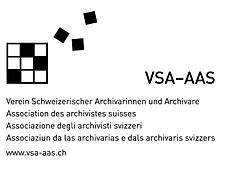
- Further explored a partnership with the broadcasting company SRF to open their archived content.
- Promoted the 2023 GLAM-on-Tour events with invitations to the press and created a video for the 2022 event in Montreux.
- Ran various media campaigns to support programmatic and outreach activities, including International Museum Day, International Archives Week and a project with the National Library.
- Continued growing our newsletter readership and improving our website, including fixing a bug on our contact form and streamlining our process for responding to inquiries.
- Attended events for various partnerships, including Digital Alliance meetings, a Parldigi dinner and the 1st General Assembly for Wikimedia EU in Prague.
- We froze our X (formerly Twitter) account, as the platform’s values no longer align with our own, choosing to focus on our new account on Mastodon, which is running well.
Programme impact[edit]
Key accomplishments[edit]
- Our Friendraising event attracted around 40 attendees and was an important step forward in engaging new partners and strengthening relationships with existing ones.
- We began improving membership engagement with a new strategy and onboarding approach.
- We continued to see impressive open rates for our newsletters. The open rate grew 3.5% from last year and remains well above the industry average.
- Our fundraising campaigns were more effective and aligned thanks to more efficient processes.
Lessons learned[edit]
- The Friendraising event was a good size (approximately 40 people) to create quality contacts with future partners and donors.
- For future networking events, we should continue to invite all of our existing regional contacts – donors, members and project partners – but we should also broaden our horizons, proactively reaching out to new, potentially interested people and partners.
- Implementing a key lesson from past Friendraising events, we followed up with all attendees, inviting them to new activities in Ticino and developing new project ideas.
- We learned that for strong social media engagement, good content isn’t enough. We also need technical support to manage these channels for fundraising objectives and more efficient outreach.
Looking ahead[edit]
In 2024, we will expand our outreach activities, advocating for issues important to us as a Movement, such as copyright, digital public infrastructure, net neutrality and digital self-determination. In line with this expansion, we will change the programme name to International & National (Public) Relations and Partnerships.
In 2024, we will continue to focus on in-person meetings with Parliament and continue to support and engage with national and international groups, both within the Movement, such as Wikimedia EU and Wikifranca, and with external organisations that share our values. We will also begin implementing our new thematic focus and continue integrating fundraising into project planning. We will take the feedback and initial learnings from our new membership engagement strategy and will continue to refine how we engage members and volunteers.
Alongside our General Assembly on 27 April in Bern, we will organise “Wikipedia Day”, an event featuring high-level speakers and discussions for partners, donors, members and other active people related to our association. This will create more visibility for our chapter and hopefully garner more partnerships and collaborations with like-minded organisations.
Programme Innovation[edit]
Overview[edit]
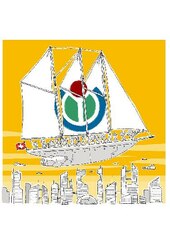
In 2023, we celebrated the one-year anniversary of our new strategic impact direction around experimentation and innovation, also referred to as the Innolab. The goal of the Innovation programme is to create a space and a framework for Wikimedia CH to become a learning organisation while identifying and advancing projects that support our core purpose.
In the Innolab’s first full year of operations, the programmatic activities built upon the foundation set forth in its strategy. The programme forged important partnerships around topics like the knowledge gap, AI and climate change, among others. It also continued to support innovation within the other programmes and advance internal systems and processes that improve coordination and efficiency.
Highlight activity[edit]
Wiki Science Competition
The Wiki Science Competition, a photo contest that collects high-quality scientific images for public use, has significantly impacted education and science. It routinely garners robust participation from a global audience of professionals and amateurs alike, including photographers, scientists and educators.

Wikimedia CH is a key supporter of the Wiki Science Competition, not only in Switzerland but also on the international stage in collaboration with Wikimedia Estonia. Our involvement has been pivotal in promoting the Swiss contest, enhancing its visibility and impact within the Swiss scientific and educational communities. Our support demonstrates our dedication to enhancing the accessibility and dissemination of scientific knowledge worldwide.
The 2023 edition of the competition attracted thousands of entries from numerous countries. The contest showcased a wide range of scientific disciplines through photographs, diagrams and non-photographic media. These contributions have greatly enriched the visual representation of science, particularly on Wikimedia Commons.
The submissions are not only beautiful but also invaluable educational tools, helping to visually explain complex scientific concepts and phenomena, thereby enhancing learning experiences for students and educators. The contest has been instrumental in increasing public interest in science, making scientific research more accessible and understandable and fostering an appreciation for the beauty and complexity of scientific exploration.
In line with the principles of open access and with Wikimedia CH’s mission, the competition has significantly contributed to the public domain, offering freely usable scientific images and supporting the wider movement towards open access to scientific knowledge. The contest continues to be a cornerstone in the promotion of scientific knowledge and education through open-access platforms.
Key programme activities[edit]

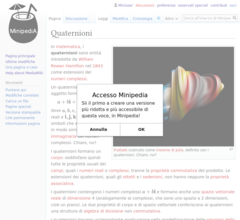
- Continued to advance the programme strategy by helping other programmes to improve their processes and activities, defining projects to incubate and creating new partnerships to explore and strengthen.
- Helped fund and support the “Fill the Data Gap” project to address digital discrimination and data gaps with two pivotal data crowdsourcing projects: one focusing on digital hate imagery and another identifying barriers in footpaths for barrier-free mapping.
- Partnered with Lib4RI and Science et Cité on the WikiKlima project, which aims to aggregate information related to climate change across Wikimedia platforms and bridge the gap between complex scientific data and public comprehension. The collaboration, which also identifies content gaps, will ensure that the content is not only extensive but also scientifically robust and reliable, making it a valuable resource for both the general public and the scientific community.
- Explored the integration and impact of AI technologies in supporting Wikimedia projects, analysing potential actions to enhance Wikimedia projects and assessing the impact of ChatGPT on the traffic and engagement within these projects. This initiative was pivotal in determining effective strategies for using AI to enhance the content quality, accessibility and reach of Wikimedia’s vast knowledge base.
- Finished the new IT strategy, which includes a risk assessment, knowledge transfer and the Tech Boost concept to enhance projects via developer support.
- Identified new internal tools to support team and project functioning, including the Kanban framework that the team now uses to track projects.
- Established partnerships with technical partners, mainly in the fields of innovation, science and IT.
- Continued to help the other programmes introduce innovation into their activities by facilitating innovation sprints and the concept of continuous improvement for their projects.
Programme impact[edit]
Key accomplishments[edit]
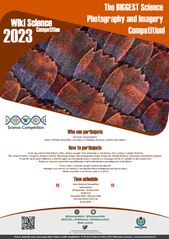
- Our support of the “Fill the Data Gap” project helped it make significant strides in raising awareness about digital discrimination and the importance of closing data gaps. Through our presentations and workshops, we have educated a wide audience on these critical issues. The crowdsourcing projects have begun to address specific data gaps, leading to tangible improvements, such as developing more inclusive, barrier-free maps.
- Through our collaboration with Lib4RI and Science et Cité on WikiKlima, we have helped establish a solid foundation, highlighting the project’s potential to be a key educational and informational resource.
- Our support of the Wiki Science Competition has helped the photo contest continuously grow over the years, enriching Wikimedia projects with scientific knowledge, engaging new audiences and promoting cross-cultural and international collaboration. This project has been critical to advancing our commitment to fill the knowledge gap in science and scientific content.
- A diverse range of programme activities and outreach helped engage a growing community of scientists and technicians who are enthusiastic about free knowledge.
Lessons learned[edit]
- The continuous growth and reach of the Wiki Science Competition can be attributed to building upon the learnings of previous contests, leading to more efficient organisation, broader communication strategies and an increased awareness of the competition. While we have contributed to this improvement, we can also learn from it for other activities.
- The “Fill the Data Gap” project brought many learnings around inclusion, a key topic for our chapter. Namely, the diversity of affected groups and their varying needs underscores the complexity of addressing data gaps. A one-size-fits-all approach is insufficient; tailored strategies are necessary for effective interventions. Focusing on concrete cases is crucial for generating interest, solving specific problems and deriving practical methodological insights. There’s a significant need for a diversity framework to guide efforts in closing data gaps, ensuring that the process of digitalisation is equitable and inclusive.
- A key learning from the WikiKlima project is that the focus should not only be on demonstrating the existence of climate change but also on exploring viable solutions. This approach aims to empower the public with knowledge that extends beyond the problem to actionable strategies for addressing climate change.
- Our exploration of AI technologies led to the recognition that while ChatGPT’s approach to content generation may not fully align with Wikimedia’s principles of transparency and sustainability due to concerns about content quality and verifiability, AI nonetheless holds significant potential for enhancing Wikimedia projects, particularly in areas like vandalism monitoring and community patrolling support. To this end, we should prioritise three key ideas:
- Principle-based AI Integration: Aligning AI integration with Wikimedia’s core principles – sustainability, equity and transparency – is crucial.
- Human-AI Collaboration: It’s essential to maintain a balance between AI automation and human editorial oversight to ensure content accuracy and reliability.
- Broader Impact Assessment: We must understand the broader implications of AI on user engagement and the ethical considerations in deploying AI tools in educational and informational contexts.
Looking ahead[edit]
In 2024, we will continue the strategic alignment of the programme, building in-house knowledge and partnerships to advance our mission. This includes defining the incubator structure and projects to incubate, as well as how to support other programmes. We’ll continue to strengthen technological and engineering aspects and build up projects we started in 2023 around climate change, knowledge equity and AI. We will also continue developing a translation tool for multilingual online meetings.
We’ll continue supporting the “Fill the Data Gap” project with presentations and workshops, and we will establish partnerships with Amnesty International and Awareness in Art to enhance and integrate workshops into their educational programs. The aim is to complete the first phase of the project by the second quarter of 2024, alongside developing a framework for diversity and data gaps to address digital justice.
Looking ahead as a chapter[edit]
Looking ahead, 2024 will see further movement on our path to organisational efficiency. Our participation in the “Value for Good” programme, our work to measure and improve our environmental impact and our collaboration with local works councils will help us continuously improve in all areas of our organisation.
Going forward, we will prioritise external relations and policy work, building on the excellent results we have achieved in past years through our partnership with Parldigi and other actors in Switzerland. We will also continue to collaborate closely with Wikifranca and Wikimedia Europe, both relatively new structures that need time to become fully operational.
With new GLAM and Community strategies in place and reflected in the annual plans, we will start implementing the various activities with a renewed focus and restructured teams. We hope to quickly recruit a new GLAM Manager to replace our previous one, who left at the end of 2023, so we maintain momentum.
In terms of recruitment, we will also ensure that the back office is staffed appropriately and can operate effectively. With our new Operations Lead starting in January, it is a good time to assess roles and responsibilities and ways of working to improve our efficiency. We have still been unable to recruit for certain competencies and for roles currently lacking in our organisation that need attention, such as digital fundraising and HR. We hope to find a way to add these skills to our team, whether by recruiting a new team member or working with an external consultant.
Overall, we’re looking forward to building upon the learnings and successes of the past year as we move into a new one. With a more effective structure and processes, a stronger, more robust team and an improved approach to community and member engagement, we are well-placed to expand our impact in Switzerland and beyond.
Revenues received during this 12-month period[edit]
Table 2 Please report all spending in the currency of your grant unless US$ is requested.
- Please also include any in-kind contributions or resources that you have received in this revenues table. This might include donated office space, services, prizes, food, etc. If you are to provide a monetary equivalent (e.g. $500 for food from Organization X for service Y), please include it in this table. Otherwise, please highlight the contribution, as well as the name of the partner, in the notes section.
Revenue source Currency Anticipated Q1 Q2 Q3 Q4 Cumulative Anticipated ($US)* Cumulative ($US)* Explanation of variances from plan Exchange Rate 1,1136 1,1136 Membership fees (3000) CHF 14 000,00 4 200,00 10 866,99 575,00 150,00 15 791,99 15 590,40 17 585,96 Thanks to the launch of our new membership strategy we were able to exceed forecasts. WMF Fundraising Costs (3402) CHF 153 420,00 41 049,44 606,60 463,56 122 130,72 164 250,32 170 848,51 182 909,16 We raised slightly more than anicipated, hence the fundraising costs were slightly higher. Donations WMCH (3410) CHF 1 438 000,00 155 376,63 814 894,63 130 872,89 2 469 423,56 3 570 567,71 1 601 356,80 3 976 184,20 We worked hard on our digital fundraising efforts and extended our letter campaigns. The results exceeded by far our expectations. Pro Bono / In-kind donations (3420) CHF 2 500,00 278,00 947,00 1 571,00 6 497,50 9 293,50 2 784,00 10 349,24 We are slowly getting better in tracking probono expenses. TOTAL CHF 1 607 920,00 200 904,07 827 315,22 133 482,45 2 598 201,78 3 759 903,52 1 790 579,71 4 187 028,56
* Provide estimates in US Dollars
Spending during this 12-month period[edit]
Table 3 Please report all spending in the currency of your grant unless US$ is requested.
- (The "budgeted" amount is the total planned for the year as submitted in your proposal form or your revised plan, and the "cumulative" column refers to the total spent to date this year. The "percentage spent to date" is the ratio of the cumulative amount spent over the budgeted amount.)
Expense Currency Budgeted Q1 Q2 Q3 Q4 Cumulative Budgeted ($US)* Cumulative ($US)* Percentage spent to date Explanation of variances from plan Exchange Rate 1,1136 1,1136 PROGRAM 1 - GLAM 130 000,00 29 000,51 23 257,07 26 356,82 57 403,78 136 018,18 130 647,40 136 695,55 104,63 A busy year for GLAM projects which even meant a little over-spent (this could be buffered with lesser spent in education) PROGRAM 2 - Education CHF 116 500,00 9 589,14 1 432,49 1 009,78 27 244,81 39 276,22 117 080,17 39 471,82 33,71 WMCH had a bottle neck in terms of staff in 2023. A new team only arrived in summer, and had to re-adapt plans already put forward in 2022 which could not be carried out due to the lack of human resources. PROGRAM 3 - Community CHF 117 600,00 32 655,81 13 368,56 29 509,93 27 849,69 103 383,99 118 185,65 103 898,84 87,91 The Community stepped up in efficiency since the arrival of a Lead for Switzerland. Most of the programmes could be carried out as planned; some projects had to be postponed or cancelled due to fluctuations in the volunteer community on which this programme heavily relies. Program 4: International and National Relations CHF 127 000,00 25 247,32 19 200,72 7 040,89 49 626,68 101 115,61 127 632,46 101 619,17 79,62 Some of the foreseen events were not carried out due to the lack of human resources. This explains the slight under-spent. PROGRAM 5- Innovation CHF 157 000,00 8 010,83 23 574,47 18 636,46 73 985,83 124 207,59 157 781,86 124 826,14 79,11 Programme Innovation is still very new; 2023 already saw the beginning of some interesting initiatives. One foreseen project was not carried out in 2023 as more information and research were needed in order to start the operations. This explains the slight under-spent. Staff Wages & Expenses CHF 1 367 570,00 289 890,27 287 351,77 299 883,23 407 834,40 1 284 959,67 1 374 380,50 1 291 358,77 93,96 Four new part-time additions fo the team as well as one person leaving WMCH for the end of 2023. There always is a fluctuation as human resources are definitely constantly changing. Operations (excludes staff and programs) CHF 413 336,00 94 810,54 116 064,88 67 296,70 88 404,94 366 577,06 415 394,41 368 402,61 88,69 Without physical offices, we are trying to keep these costs as low as possible. TOTAL CHF 2 429 006,00 489 204,42 484 249,96 449 733,81 732 350,13 2 155 538,32 2 441 102,45 2 166 272,90 88,74
* Provide estimates in US Dollars
Signature[edit]
- Once complete, please sign below with the usual four tildes.
- Jenny WMCH (talk) 08:53, 26 March 2024 (UTC)

